|
|
|
Sort Order |
|
|
|
Items / Page
|
|
|
|
|
|
|
| Srl | Item |
| 1 |
ID:
147244
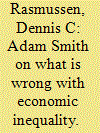

|
|
|
|
|
| Summary/Abstract |
This article explores Adam Smith's attitude toward economic inequality, as distinct from the problem of poverty, and argues that he regarded it as a double-edged sword. On the one hand, as has often been recognized, Smith saw a high degree of economic inequality as an inevitable result of a flourishing commercial society, and he considered a certain amount of such inequality to be positively useful as a means of encouraging productivity and bolstering political stability. On the other hand, it has seldom been noticed that Smith also expressed deep worries about some of the other effects of extreme economic inequality—worries that are, moreover, interestingly different from those that dominate contemporary discourse. In Smith's view, extreme economic inequality leads people to sympathize more fully and readily with the rich than the poor, and this distortion in our sympathies in turn undermines both morality and happiness.
|
|
|
|
|
|
|
|
|
|
|
|
|
|
|
|
| 2 |
ID:
142694
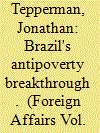

|
|
|
|
|
| Summary/Abstract |
In recent years, as public anxiety over growing inequality has intensified, policymakers and academics have started scrambling for some increasingly extreme solutions. India, for example, has launched massive programs to provide the poor with food and jobs, and the French economist Thomas Piketty has famously proposed a redistributive global wealth tax .
|
|
|
|
|
|
|
|
|
|
|
|
|
|
|
|
| 3 |
ID:
098231
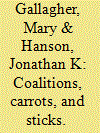

|
|
|
| 4 |
ID:
050232
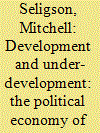

|
|
|
|
|
| Publication |
New Delhi, Viva Books Private Limited, 2004.
|
| Description |
xi, 501p.
|
| Standard Number |
8176497835
|
|
|
|
|
|
|
|
|
|
|
|
Copies: C:1/I:0,R:0,Q:0
Circulation
| Accession# | Call# | Current Location | Status | Policy | Location |
| 047565 | 330.9/SEL 047565 | Main | On Shelf | General | |
|
|
|
|
| 5 |
ID:
005967
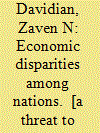

|
|
|
|
|
| Publication |
Calcutta, Oxford Univ. Pr., 1994.
|
| Description |
xxix,304p.
|
| Standard Number |
0195634756
|
|
|
|
|
|
|
|
|
|
|
|
Copies: C:1/I:0,R:0,Q:0
Circulation
| Accession# | Call# | Current Location | Status | Policy | Location |
| 037393 | 330/DAV 037393 | Main | On Shelf | General | |
|
|
|
|
| 6 |
ID:
151454
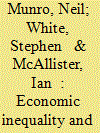

|
|
|
|
|
| Summary/Abstract |
At the third BRICS summit on Hainan Island in 2011, Russian president Dmitri Medvedev claimed that the BRICS countries—with the addition of South Africa to Brazil, Russia, India and China—now included the ‘biggest states of three continents’.
|
|
|
|
|
|
|
|
|
|
|
|
|
|
|
|
| 7 |
ID:
142692
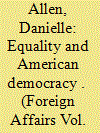

|
|
|
|
|
| Summary/Abstract |
Since the trend toward rising economic inequality [1] in the United States became apparent in the 1990s, scholars and commentators have heatedly debated its causes and consequences. What has been less evident is a vigorous positive discussion about what equality means and how it might be pursued.
|
|
|
|
|
|
|
|
|
|
|
|
|
|
|
|
| 8 |
ID:
146463
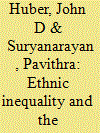

|
|
|
|
|
| Contents |
Why does ethnicity become a salient element of electoral politics in some places but not others? The authors argue that in majoritarian systems, ethnic identity is most salient to electoral behavior when there are high levels of inequality between ethnic groups. Theytest this argument in the Indian states and find that state-level party system ethnification is strongly correlated with economic inequality between groups, a pattern they also find in cross-national data. Theyalso show that in India, when income differences between groups increase, the groups tend to support different parties. The analysis reveals a strong class component to ethnic politics in India, underscoring the possibility that what scholars often view as identity politics can have an element of class politics in disguise.
|
|
|
|
|
|
|
|
|
|
|
|
|
|
|
|
| 9 |
ID:
112777
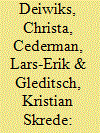

|
|
|
|
|
| Publication |
2012.
|
| Summary/Abstract |
Case study evidence suggests that inequality between regions in federations affects the risk of secessionist conflict. However, the conventional quantitative literature on civil war has found little support for a link between economic inequality and civil war. We argue that this seeming discrepancy in part stems from differences in the conceptualization of inequality and its operationalization, which has focused on individual-level wealth differences. In contrast, we investigate regional-level inequality, which is more readily applicable to understanding possible incentives for internal conflict. We adopt a spatial approach, based on new geo-coded data on administrative units in 31 federal states between 1991 and 2005, economic wealth, and ethnic settlements, and demonstrate strong evidence that regional inequality affects the risk of secessionist conflict. The results indicate that in highly unequal federations, both relatively developed and underdeveloped regions are indeed more likely to be involved in secessionist conflict than regions close to the country average. In addition, we provide evidence that exclusion from central state power as well as ethnic groups' access to regional institutions are associated with an increased risk for secessionist conflict. The findings on inequality remain robust even when controlling for other confounding factors such as country GDP, population and war history.
|
|
|
|
|
|
|
|
|
|
|
|
|
|
|
|
| 10 |
ID:
138044
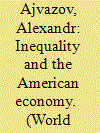

|
|
|
|
|
| Summary/Abstract |
Economic inequality in the US and most countries has risen sharply in the last few decades. This article analyses the process that accounts for the growing concentration of capital and draws paralles with the state of affairs which resulted in the great depression.
|
|
|
|
|
|
|
|
|
|
|
|
|
|
|
|
| 11 |
ID:
134104
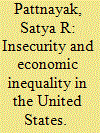

|
|
|
|
|
| Publication |
2014.
|
| Summary/Abstract |
In recent memory, the United States has lived under a heightened sense of insecurity. This sense of insecurity, which initially emanated from the terrorist attacks in September 2001, subsequently has been extended to the employment and financial sectors. As a response to terrorism, multiple Congressional laws have put added restrictions on the movement of humans, capital, and goods and services. On the whole, such policy changes have contributed to a climate of securitization of the major areas of American life. The sense of insecurity has been correlated with a level of economic inequality previously unseen in American history. It is argued that to address both issues simultaneously, the United States should foster improved relations with both Mexico and Canada. The pending legislation in the US Congress on comprehensive immigration reform may hold one of the keys to addressing the problems of both insecurity and inequality in a meaningful way.
|
|
|
|
|
|
|
|
|
|
|
|
|
|
|
|
| 12 |
ID:
185148


|
|
|
|
|
| Summary/Abstract |
The purpose of this article is to study empirically whether the Kuznets’ curve hypothesis on inequality and development is present in the economies located in Africa, as well as whether there is a minimum income for this hypothesis to begin to be fulfilled. In order to study this question, a panel of data from 45 countries is available for the period 1975–2019, and these data are analysed through a graphical point of view and through an econometric analysis using the pooled mean group estimator. The results obtained allow us to conclude that there is evidence in favour of Kuznets’ hypothesis and that a minimum level of income is required for it to be significantly observed. As well as the fact that today there is still a palpable heritage of European colonization.
|
|
|
|
|
|
|
|
|
|
|
|
|
|
|
|
| 13 |
ID:
119892
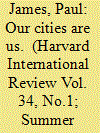

|
|
|
|
|
| Publication |
2012.
|
| Summary/Abstract |
As the dominant site and sign of human settlement, the city exemplifies and displays the fundamental concerns of the human condition in the twenty-first century. Just as urban living concentrates us in close proximity, the city clusters clichés and sermons, critiques and self-serving assurances. The world's most livable cities are well-planned and prosperous. Slums are disgusting. Congestion causes road rage. Electric vehicles are the answer. Planning is good.
|
|
|
|
|
|
|
|
|
|
|
|
|
|
|
|
| 14 |
ID:
087671
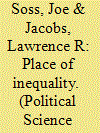

|
|
|
|
|
| Publication |
2009.
|
| Summary/Abstract |
Joe Soss and Lawrence R. Jacobs argue that the widely held prediction that rising inequalities would motivate the disadvantaged to use their political rights seems to falter badly in the United States today. They present findings that demonstrate how inequality has reshaped participation patterns in the American polity.
|
|
|
|
|
|
|
|
|
|
|
|
|
|
|
|
| 15 |
ID:
186815


|
|
|
|
|
| Summary/Abstract |
Despite extensive scholarly interest in the association between economic inequality and political violence, the micro-level mechanisms through which the former influences the latter are not well understood. Drawing on pioneering theories of political violence, social psychological research on relative deprivation, and prospect theory from behavioral economics, we examine individual-level processes that underpin the relationship between inequality and political violence. We present two arguments: despite being a key explanatory variable in existing research, perceived lower economic status vis-à-vis other individuals (an indicator of relative deprivation) is unlikely to motivate people to participate in violence; by contrast, although virtually unexplored, a projected decrease in one’s own economic status (prospective decremental deprivation) is likely to motivate violence. Multilevel analyses of probability samples from many African countries provide evidence to support these claims. Based on this, we posit that focusing on changes in living conditions, rather than the status quo, is key for understanding political violence.
|
|
|
|
|
|
|
|
|
|
|
|
|
|
|
|
| 16 |
ID:
119657
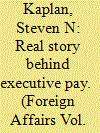

|
|
|
|
|
| Publication |
2013.
|
| Summary/Abstract |
As the share of income taken home by top earners in the United States has risen over the past few decades, so, too, has popular concern about economic inequality -- something the Occupy Wall Street movement loudly reminded Americans about in 2011. Much of the outrage has centered on the compensation of the United States' top corporate executives, who are said to be taking home ever-fatter paychecks, while the incomes of lower-level employees have stagnated. "American workers are having to make do with less," an AFL-CIO official complained to The New York Times last year, "while C.E.O.s have never had it better." (Europeans have also gotten worked up over these issues, with the EU proposing rules that would cap bankers' bonuses.)
|
|
|
|
|
|
|
|
|
|
|
|
|
|
|
|
| 17 |
ID:
163436
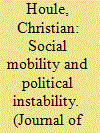

|
|
|
|
|
| Summary/Abstract |
Does social mobility foster political stability? While there is a vibrant literature on the effect of economic inequality on political unrest, the recent literature has remained silent about the effect of social mobility on instability. Yet, inequality and social mobility, although related, are fundamentally distinct, and immobility is likely to be perceived as even more unfair than inequality, meaning that it may generate at least as much grievances. In this article, I argue that social immobility fuels political instability. To test this hypothesis, I develop an indicator of social mobility covering more than 100 countries worldwide. I then conduct the first large-N cross-national test of the effect of social mobility on political instability to date. Consistent with my argument, I find that countries with low social mobility levels are more likely to experience riots, general strikes, antigovernment demonstrations, political assassinations, guerillas, revolutions, and civil wars.
|
|
|
|
|
|
|
|
|
|
|
|
|
|
|
|
| 18 |
ID:
133656
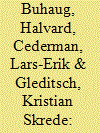

|
|
|
|
|
| Publication |
2014.
|
| Summary/Abstract |
Much of the recent research on civil war treats explanations rooted in political and economic grievances with considerable suspicion and claims that there is little empirical evidence of any relationship between ethnicity or inequality and political violence. We argue that common indicators used in previous research, such as the ethno-linguistic fractionalization (ELF) and the Gini coefficient for income dispersion, fail to capture fundamental aspects of political exclusion and economic inequality that can motivate conflict. Drawing on insights from group-level research, we develop new country-level indices that directly reflect inequalities among ethnic groups, including political discrimination and wealth differentials along ethnic lines. Our analysis reveals that these theoretically informed country profiles are much better predictors of civil war onset than conventional inequality indicators, even when we control for a number of alternative factors potentially related to grievances or opportunities for conflict.
|
|
|
|
|
|
|
|
|
|
|
|
|
|
|
|
| 19 |
ID:
173936
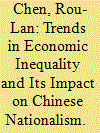

|
|
|
|
|
| Summary/Abstract |
In 2016, the Brexit referendum and Donald Trump’s electoral victory once again brought xenophobic nationalism into the world spotlight. Surprisingly, in the United Kingdom and the United States, a dramatic increase in wealth inequality impelled the working poor to cling more tightly to nationalism. In recent times, China has also witnessed this correlation of resurgent nationalist aspirations and an increasing gap between rich and poor. In light of these international developments, the primary objective of this study is to explore how China’s increasing inequality is influencing Chinese nationalism. The question of whether the Chinese youth who agonize over the trend of wealth inequality has paradoxically grown more attached to Chinese nationalism is also intriguing. Based on structural equation modeling, the estimated results show that, conversely, the increase in economic inequality in China has led to a decline in Chinese nationalism. In particular, disaffected Chinese youth with higher education who suffer from increasing economic disparity have been reluctant to embrace nationalism.
|
|
|
|
|
|
|
|
|
|
|
|
|
|
|
|
| 20 |
ID:
179871
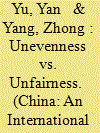

|
|
|
|
|
| Summary/Abstract |
Does economic inequality in China have political repercussions? While China scholars have approached this question in various ways, few studies have directly tested the relationship between people's perceptions of income inequality and political support in China. This article examines the direct relationship between perceptions of income inequality, especially the perception of fairness in income distribution, on the one hand, and people's subjective support for China's political regime, on the other. By drawing data from the 2016 Asian Barometer Survey, the authors employ factor analysis, multiple imputation for missing values, and ordinary least squares regression analysis to estimate the relationship between perceptions of income inequality and political support. Results have consistently shown that the perceived unfairness of income distribution overshadows the perceived level of income disparity in influencing people's regime support. Chinese respondents who think income distribution is unfair tend to show weak political support for the political regime in China. These findings suggest that even though some Chinese people may be tolerant of the widening income gap in China, the perceived unfairness in the income gap poses a potential threat to the Chinese government.
|
|
|
|
|
|
|
|
|
|
|
|
|
|
|
|
|
|
|
|
|